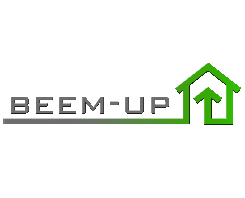
Details
Description
BEEM-UP aimed to demonstrate the economic, social and technical feasibility of retrofitting initiatives, drastically reducing energy consumption in existing buildings, and paving the way towards massive market uptake. BEEM-UP involved building owners at three sites in France, Sweden and the Netherlands in implementing an innovative approach, to go beyond a 75% reduction in space heat energy consumption, in addition to reducing total energy consumption. The project demonstrated ambitious energy reduction as the economically most attractive alternative for retrofitting.
Map
Project demonstration sites
BEEM-UP Site Delft
City
BEEM-UP Site Alingsas
City
BEEM-UP Site Paris
City
Results
In Paris the use of general electricity and heating has decreased after refurbishment (60-65% savings for heating, 58% for general electricity). There is almost no saving observed for the domestic hot water (DHW) consumptions in the Paris site even if the Biofluids system is providing free energy for the hot water production. This is due to the large amount of energy lost in the DHW distribution circuit. Compared to the general objectives of the project, the results obtained for heating savings are a little bit lower than those expected. Nevertheless substantial savings are however achieved even if the results are preliminary (less than one year of monitoring). Overall, buildings are more energy efficient, overall functionality is enhanced.
In Delft the savings are expressed as actual achieved savings during a two year period after the renovation. The practical results are lower than calculated, due to discrepancies between the general input parameter for the calculations and the household - and behavioral characteristics in the project. The buildings do not have collective electricity driven services, and all electricity use is for private household use, that includes pump energy for the heating system and solar hot water circulation. Overall, the energy consumption in the Delft project is 15% lower for gas (heating, hot water and cooking) than the Dutch average household and even 30% lower than the average electricity consumption. Preliminary results show that most flats investigated after the retrofit had reached energy label A.
In Alingsås good results were obtained with energy savings that are in line with the objectives of the project. The use of domestic hot water, electricity and heating has decreased after refurbishment. The savings achieved for the heating demand (80%) comply with the objectives of the project. The savings achieved for the DHW (about 12%) is lower than the predictions and it is also largely lower than the objectives of the BEEM-UP project. The objective of 45% savings in energy for domestic hot water seemed to be too ambitious especially, as the consumptions are very much dependent on tenants' behavior. The electricity consumption (sum of domestic and common consumptions) that includes lighting consumption shows a decrease of 35%.
Related topics
Mobility Type of Intervention
- Vehicles
Thematic Field
- Refurbished Building(s)
